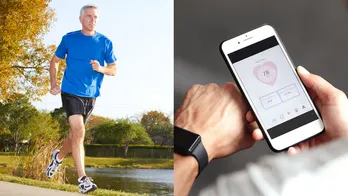Spinal cord treatment restores function for paralyzed patients in study: ‘New hope’
Ninety percent of paralyzed patients regained strength or function in their upper limbs after receiving an experimental therapy, a new study found.
After receiving spinal cord simulation from ONWARD Medical’s ARC-EX system, the participants saw "significant improvement" in their hand and arm function, according to a press release.
The study, published on Monday in Nature Medicine, included 65 participants at 14 leading spinal cord injury centers in the U.S., Europe and Canada.
MANY FAMILIES TAKE PATIENTS OFF LIFE SUPPORT TOO SOON AFTER TRAUMATIC BRAIN INJURIES: STUDY
The participants received non-invasive electrical stimulation of the spinal cord using ARC-EX, and then researchers gauged the safety and effectiveness of the system.
Improvement was seen even in people whose injuries occurred up to 34 years ago, the release stated.

After receiving spinal cord simulation from ONWARD Medical’s ARC-EX system, the participants saw "significant improvement" in hand and arm function, according to a new study. (Nature Medicine)
"When a person suffers a spinal cord injury, after two to three months of rehabilitation, they are sent home and told there is nothing further that can be done," Dave Marver, CEO of ONWARD Medical, told Fox News Digital.
The company is global; its main headquarters is in The Netherlands.
AS OZZY OSBOURNE ANNOUNCES STEM CELL THERAPY, EXPERTS URGE CAUTION, HIGHLIGHT RISKS
"This week’s publication in Nature Medicine heralds a new era in spinal cord injury care. The Up-LIFT trial demonstrated that ONWARD ARC therapy can restore strength and function of the hands and arms up to 34 years after a spinal cord injury."
"This is a game-changer for the spinal cord injury community and their loved ones."

Improvement was seen even in people whose injuries occurred up to 34 years ago, the release stated. (iStock)
The trial results far exceeded the researchers’ expected 50% response rate — giving "new hope" to people with SCI, noted lead study author Chet Moritz, Ph.D., professor of electrical and computer engineering and rehabilitation medicine at the University of Washington, in the release.
After two months, more than half the paralyzed participants regained enough "grasp force" to lift up a filled cup, pick up an item with a fork or insert a key, according to Moritz.
"This is a game-changer for the spinal cord injury community and their loved ones."
"This indicates not only improved strength and function, but also the potential for greater independence with ARC-EX Therapy," he said.
Additional benefits included reduced muscle spasms, improved sleep and a greater sense of touch in the upper body, the release said.
Eighty-seven percent of the participants reported having an improved quality of life after receiving the therapy.

After two months, more than half of the paralyzed participants regained enough "grasp force" to lift up a filled cup, the study noted. (iStock)
"Improvement in arm and hand function is among the highest priorities for people with tetraplegia (paralysis in the upper and lower body) who have endured far too long without effective therapies for functional recovery," Marver, the company CEO, said in the release.
"The findings published in Nature Medicine provide critical and compelling evidence that ARC-EX has the potential to restore independence in daily activities and improve [the patients'] quality of life."
‘LIQUID GOLD’ COULD BRING NEW HOPE TO MULTIPLE SCLEROSIS PATIENTS, STUDY SUGGESTS: ‘PROFOUND BENEFIT’
Dr. Marc Siegel, clinical professor of medicine at NYU Langone Medical Center and a Fox News medical contributor, was not involved in the trial but commented on the results.
"This has been tried for many years with reports that it helps, but it has not yet gone mainstream in patients with upper and lower spinal cord paralysis," he told Fox News Digital.
"Improvement in arm and hand function is among the highest priorities for people with tetraplegia."
"This small study in a very prominent journal is very encouraging in terms of some return of upper extremity function," Siegel continued.
"It warrants further study and more universal use in these patients."
It’s possible that this type of spinal cord stimulation could be combined with the increasing use of other brain and spine interfaces to restore function, the doctor added.

ONWARD Medical’s ARC-EX system, pictured here, performs non-invasive electrical stimulation of the spinal cord. (ONWARD Medical)
John Hinson, M.D., an orthopedic surgeon in Florida, was also not involved in the study but shared his insights on the findings.
"Patients with incomplete quadriplegia can be left with weakness and muscle spasm, as well as sensory changes that can cause significant loss of function," he told Fox News Digital.
CLICK HERE TO SIGN UP FOR OUR HEALTH NEWSLETTER
Traditional treatments for these injuries have included physical therapy, he noted, but results can be limited.
"Review of the trial results shows that by two months of use, over half of the patients showed significant functional improvement in activities such as grasping and pinching required for basic daily tasks," Hinson said.
"If these results can be predictably achieved, it would greatly improve the lives of patients with spinal cord injuries that resulted in incomplete quadriplegia."

Traditional treatments for these injuries have included physical therapy, but results can be limited, one doctor noted. (iStock)
This could potentially be a "big factor" in the treatment of these patients, according to Hinson.
ONWARD has submitted an application to the U.S. Food and Drug Administration (FDA) to gain approval for the ARC-EX system, with clearance expected later this year.
CLICK HERE TO GET THE FOX NEWS APP
"We are laser-focused on our commitment to bringing this first-of-its-kind technology to the SCI community as soon as possible," Marver said.
The ARC-EX System will require a prescription from a qualified health care professional once it is cleared for use, according to the company.
For more Health articles, visit www.foxnews.com/health.
Disclaimer: The copyright of this article belongs to the original author. Reposting this article is solely for the purpose of information dissemination and does not constitute any investment advice. If there is any infringement, please contact us immediately. We will make corrections or deletions as necessary. Thank you.







